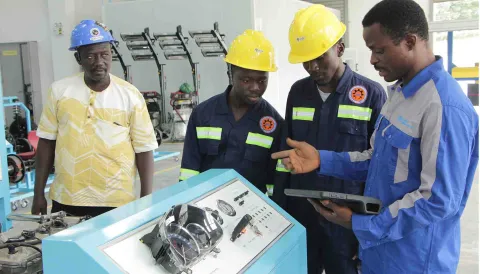About Us
Established in 2020, the Automotive and Agricultural Mechanization Engineering Department (AAMED) of Kumasi Technical University (KsTU) under the Faculty of Engineering and Technology was carved out of the existing Mechanical Engineering Department.
AAMED has been created to address the skill gap in automotive and agricultural establishments as well as the need to mechanise the agricultural sector of the economy. This will be done through ....

Our Vision, Mission & Core Values

To become a top-tier, internationally renowned, and well-liked training centre for the agricultural and automotive engineering with well-trained and experienced staff, state-of-the-art world-class labs, and training facilities.

To train and equip engineers in automotive and agricultural mechanisation who can advance science and technology via effective instruction, learning, research, and hands-on, real-world experience.

Click Here to View Our Core Values
Integrity
Accountability and moral conduct in all of our endeavours and interactions.
Agility
The pursuit of the development, persistence, and flexibility needed for success in a world of education and innovation that is continuously evolving on a personal and professional level.
Diversity and equal opportunity
Dedication to creating a community with various backgrounds, experiences, and viewpoints; one that values these distinctions as necessary for fruitful inquiry, growth, and learning—and treats each of its members equally and justly.
Community
A supportive departmental culture that encourages meaningful engagement and cooperation amongst academics, staff, and students across traditional borders of academic career
Sustainability
Financial, human, physical, and digital resources management in a way that maximises efficiency while minimising harm to the environment and society.
Empathy
We take into account the circumstances and viewpoints of others when resolving issues and creating long-lasting solutions.


